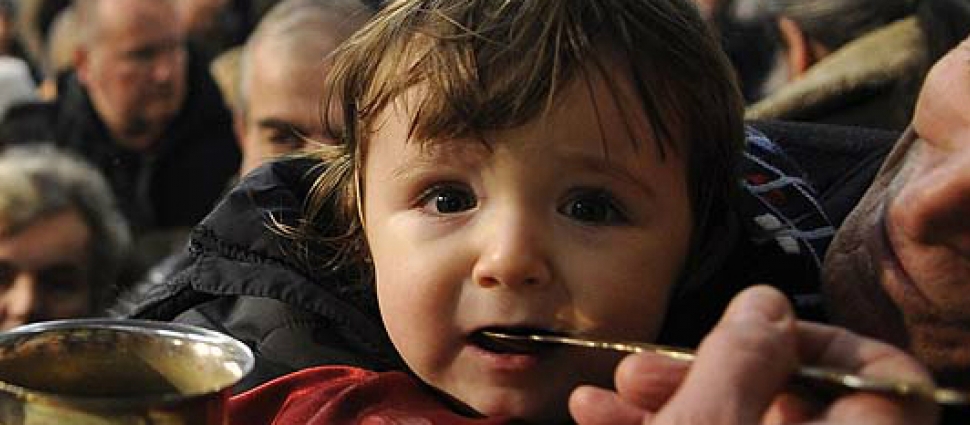Apples & Oranges

Dec 13, 2016
In my previous article, I discussed one of Stephen Marshall’s arguments for infant baptism: infants of believers (covenant children) should be baptized because they partake of the spiritual realities signified and sealed by baptism. This is not to say that all covenant children partake of the inward grace of baptism but that they are capable of it and some do experience it, as is the case with adults. One of the counter-arguments that Marshall confronted—and one that paedobaptists continue to face today—is that he should have also embraced paedocommunion. Paedocommunion is the practice of serving the Lord’s Supper to covenant children on the basis of their baptism or covenant membership and thus before they are able to understand and make a profession of faith. Marshall stated the objection thus: “But if their being capable of the spirituall part, must intitle them to the outward signe, why then doe we not also admit them to the Sacrament of the Lords Supper, which is the seale of the Covenant of Grace, as well as the Sacrament of Baptisme?”
The Argument of Paedocommunion
In a nutshell, the counter-argument is that (most) paedobaptists are inconsistent. Baptism and the Lord’s Supper are both signs and seals of the covenant of grace. If covenant infants are worthy recipients of the one, then it follows that they are worthy recipients of the other. If faith is not necessary for baptism, then faith is not necessary for the Lord’s Supper. Indeed, the very same arguments that support paedobaptism simultaneously support paedocommunion. Children of believers should partake of the covenant meal because they are covenant members and experience covenant blessings. All paedobaptists, therefore, need to bite the bullet and either embrace paedocommunion or reject infant baptism.
Stephen Marshall's Response
Marshall, of course, was not the first one to address this objection and his answer was in tune with those who had gone before him. He noted that it was illegitimate to argue from baptism to the Lord’s Supper because the two sacraments are not identical. In other words, comparing baptism with the Lord’s Supper is like comparing apples with oranges. Yes, both apples and oranges are fruit, but they are significantly different kinds of fruit. Baptism and the Lord’s Supper are both sacraments of the new covenant but they differ in important respects so that only the former is suitable for infants.
Baptism is the sacrament of our entrance into the covenant and the Lord’s Supper is the sacrament of our “growth, nourishment and augmentation” in the covenant. Scripture tells us that infants are capable of the grace sealed in baptism; but Scripture is “altogether silent” with respect to their ability to partake of the grace sealed in the Lord’s Supper. Marshall wrote:
I answer, Answ. that Infants are capable of the grace of Baptisme we are sure, not sure that they are capable of the grace signed and sealed in the Sacrament of the Lords Supper, for though both of them are seales of the new Covenant, yet it is with some difference; Baptisme properly seales the entrance into it, the Lords Supper properly the growth, nourishment and augmentation of it; Baptisme for our birth, the Lords Supper for our food; now Infants may be borne againe while they are Infants, have their Originall sinne pardoned, be united to Christ, have his image stampt upon them, but concerning the exercise of these graces and augmentation of them in Infants, while they are Infants, the Scripture is altogether silent…
Marshall’s colleague at the Westminster Assembly, the Scottish Commissioner Robert Baillie, made a similar point except that he was clearer about the infant’s inability to partake of the grace signified and sealed in the Lord’s Supper. A passive participant, as is an infant, is capable of participating in the grace signified by baptism because “as the body may be washed without any action of the party who is washed: so the virtue of Christ’s death and life may be applied in remission and regeneration, by the act of God alone to the soul as a mere patient without any action from it.” However, a passive participant is incapable of the inward grace of the Lord’s Supper because “the thing signified there is not the Lord’s body and blood simply, but his body to be eaten, and his blood to be drunken, by the actual faith of the communicants.” Or as Ursinus once put it: “Infants are not capable of coming to the Lord’s Supper, because they do not possess faith actually, but only potentially and by inclination.”
The arguments for paedobaptism, therefore, do not logically lead to paedocommunion. In fact, it is fallacious to argue from one to the other because of the differences that exist between them. The Lord’s Supper—the sacrament of growth in Christ—requires the participant to exercise actual faith whereas baptism—the sacrament of regeneration—does not. For further reading on this subject, please see my article "A Pastoral Letter on Paedocommunion."





